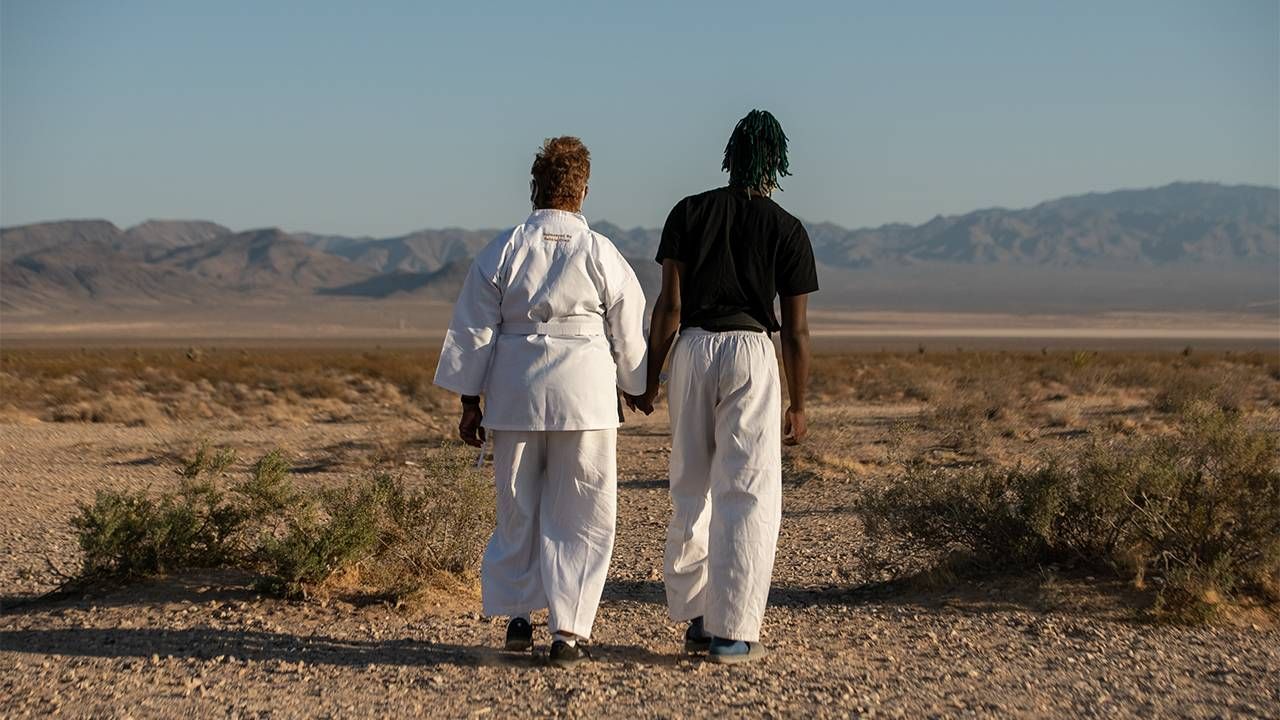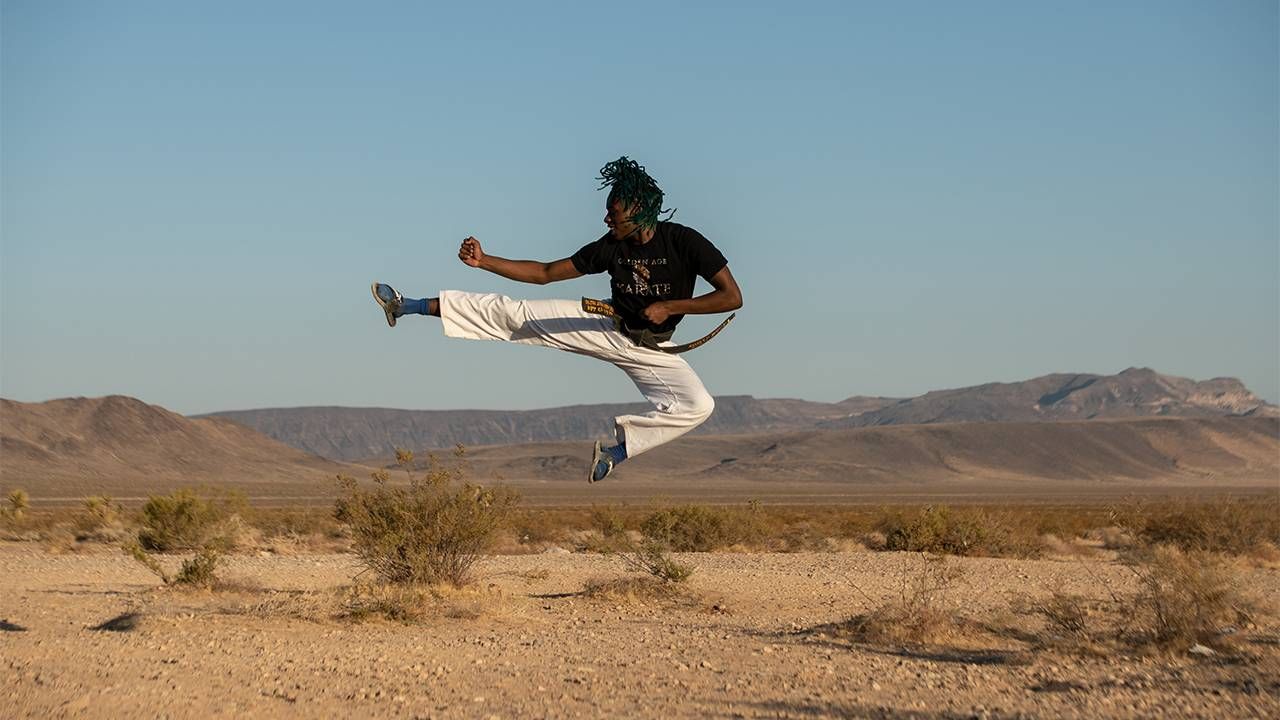The UnLonely Film Festival Celebrates Five Years
The UnLonely Project spotlights a new curated collection of short films telling stories of loneliness and isolation, but also resilience
In the short film "Elgin Park," Michael Paul Smith, an older gay man who was living a reclusive life in Pennsylvania, found joy in creating his fictitious town populated with models he crafted of old-fashioned cars, houses and storefronts.

Smith inhabited that place, as surely as he inhabited the world. "Elgin Park is a dream-like recreation of my past. It's never a lonely place for me," he said in the film. After he shares some photos of Elgin Park on the internet, a British magazine picks up a few images of the cars, leading to opportunities for Smith to connect with other creative people around the world, something which delights, but occasionally overwhelms, him.
"Film is our country's storytelling modality."
This poignant film, by award-winning filmmaker Danny Yourd, is just one of many short-narrative documentaries and animated films that are part of The UnLonely Film Festival archives, a curated selection of films specifically intended to reveal common ground and build connection for those who are feeling lonely or isolated. In short, all of us at different points in our lives.
On June 6, the collection will grow by 40 new films with the celebration of the fifth anniversary of the UnLonely Film Festival at 8 p.m. ET. Unlike other film festivals which take place over several days, the UnLonely Film Festival will feature a brief welcoming event and then all of the films will be available for viewing, and remain on unlonelyfilms.org. The films are free to watch. Participants are encouraged to RSVP in advance of the event.
The UnLonely Film Festival is part of The UnLonely Project, an initiative of The Foundation for Art and Healing, a nonprofit with a goal "to promote creative expression as an approach to improve public health" through community and individual partnerships.
Dr. Jeremy Nobel, a 2020 Next Avenue Influencer in Aging and founder of The Foundation for Art and Healing, said The UnLonely Project was launched in 2016 "in response to what I saw as a public health crisis around loneliness."
According to Nobel, the three original goals of the initiative were to increase awareness of loneliness and its toxicity; to reduce the stigma that surrounds it and to develop or partner to get programs that could foster a sense of connection.
The UnLonely Film Festival was born a year later. "We had the idea to curate a series of films that would bring people together to see that loneliness is fundamental to the human condition across a broad range of scenarios," said Nobel.
I asked what it is about film that can help foster connection.
"Film is our country's storytelling modality," he explained. "People aren't intimidated by it, but rather, they engage with it."
The Personal Journey of Film
On the website, each of the films is tagged with one or more descriptions of the subject matter, and includes topics ranging from mental health, addiction and everyday life to older adults, LGBTQ+, healing after loneliness and more.
"Some of our films are tough films," said Nobel. "They are darker, they unpack and reveal human circumstances that for many people are difficult to watch."
Not wanting to leave viewers struggling with their emotions, each selection is followed by a short orientation to the film, with an on-screen moderator offering questions and topics for reflection to help viewers better process their reactions.
"This gives people the opportunity to take their own personal journey on the film. They can explore their own relationship to loneliness, and maybe find resources for creative expression around loneliness," said Nobel.
'Golden Age Karate'
Natalie Gee, the curator for the UnLonely Film Festival, said that even within the topic of loneliness, the theme of connection is an important one.
"We also have a lot of uplifting films," she said. "And by watching any of these films, we want people to see where they can connect to the subject."

One prime example of an uplifting film is "Golden Age Karate," which the UnLonely Film Festival has selected as its Staff Pick this year.
Directed by Sindha Agha, "Golden Age Karate" tells the story of Jeffrey Wall, 16, of Dayton, Ohio, who has put his advanced karate skills (he's a first-degree black belt and in the Martial Arts Hall of Fame) to inspirational use.
After successfully teaching karate to his grandmother, Wall takes it one step further by offering a karate class to older adults in a local senior residence. As the film shows, the "students" reap both physical and emotional benefits. And so does their teacher.
In a phone interview after his high school football practice, Wall said how surprised he has been by the enthusiasm of the older adults.
"We were careful not to have COVID as a big focus, but to have the festival offer a sense of hope."
"When I was younger, I thought that people who were older really couldn't do much. But now I know that some of them can do more than the younger kids," he said. "Every time I come to teach class (he's there once a month due to his school schedule), they are all just really energetic and ready to get right into it."
Wall said the experience of working with older adults, and seeing the confidence they gain by doing karate, has "inspired me to keep having an impact on the world."
Showing Stories of the Pandemic
Staff members watched close to 80 films this year before making the difficult decision to pare the list down to about 40. "It was the most submissions we ever had, and we had trouble tossing some of them out," said Nobel.
A film festival in 2021 is most certain to contain stories addressing COVID-19, and there are two among this year's collection:
"Meet Me at the Stairs" is a 5-minute short film about an essential worker whose husband has an autoimmune disease and shows how they must remain separated in their home.
"This is The Closest to How the End of March Felt Like" is about a college student struggling with loneliness on an empty campus.
"We were careful not to have COVID as a big focus, but to have the festival offer a sense of hope," said Gee. "We've gone through [COVID] and come out on the other side. But for a lot of people, even though COVID will go away, they will still have the same challenges [of loneliness and isolation] whether due to health or age-related circumstances."
She points to the beautiful film, "Keep Calling," which is the story of Lilian, a woman with Parkinson's disease, and Michael, a young volunteer with mental health issues, and the connection they make when they sing to each other over the phone. (It is uplifting, but keep a tissue handy.)
For newcomers to the UnLonely Film Festival, there is a "Best of the Fest" section, which includes a selection of 20+ of the most popular films since the event first launched, including "Drawings for My Grandchildren," a film from the Festival's first year, about Grandpa Chan and Grandma Marina, who like Nobel, were 2020 Next Avenue Influencers in Aging.
This was the pair's first introduction to a broader audience, in a film made by their son Ji Lee, detailing their adoption of Instagram as a way to build relationships with their grandsons. It's a fun film, filled with lots of emojis and graphics.
A Return to 'Elgin Park'
In a conversation about "Elgin Park," which Yourd made in 2015, he revealed there was more to the story.
Like others, Yourd found Smith's Elgin Park photos online. As a filmmaker very interested in character-driven storytelling, he decided to call Smith with the idea for a film.
"He was very interested, and within a month, we traveled to his home and spent four days with him," said Yourd. "We hit it off, and he really started to open up to us."
So Yourd and his team returned to film more footage, which included Smith's revelations about being bullied as a young child and being closeted when he was young, in scenes which make up the emotional core of the movie.
According to Yourd, Smith was "ecstatic" about the final product, and he and Yourd stayed in touch. When Smith was dying and in home hospice a few years ago, Yourd returned to visit, and fondly recalls their final conversations.
"I know the film gave his art a breath of fresh life. He had thrived on the fact that people were connecting to him," said Yourd.


